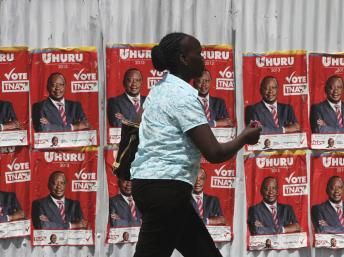Voters in Kenya go to the polls on Monday 4 March in the country's first presidential and parliamentary elections since 2007. In the lead-up to the 2013 elections the eight presidential candidates have participated in a concerted effort to promote peace, keen to avoid a repeat of the post-election violence from late 2007 to early 2008 in which over 1,100 people died and hundreds of thousands were displaced.
Recently both front-runners in the presidential race – incumbent prime minister Raila Odinga and deputy prime minister Uhuru Kenyatta – pledged to accept the election results and committed to ensuring that violence would not break out among their supporters. However there remain significant concerns that things could turn violent, mainly due to the tribal element of the nation’s parliamentary and presidential elections.
The pre-election polls reveal that Odinga and Kenyatta are running neck and neck, with support for both candidates in the mid-40 per cent range. In order to succeed Mwai Kibaki, who has served two terms as president and is not permitted to stand a third time, the winning presidential candidate must receive more than 50 per cent of the vote otherwise there will be a run-off on 11 April.
Kenyatta’s trial at the Hague on charges related to the post 2007 election violence has now been postponed, probably until summer this year leaving him available for the potential April run-offs. Kenyatta denies allegations of crimes against humanity, but if he wins the presidential election he has pledged to attend court sessions at the ICC. Kenyatta's running mate, William Ruto, who was on the opposite side to Kenyatta following the 2007 election, also faces charges at the ICC in relation to election violence.
Kenyan security officials have drafted some 99,000 police to guard polling stations on 4 March. There are also fears that the election could be disrupted by the Somali militant group al-Shabab and a secessionist group on Kenya's coast known as the Mombasa Republican Council. The United Nations (UN) estimates that 400 people have already been killed as a result of ethnic violence in the run up to the election.
In addition to Odinga and Kenyatta, the other six Kenyan presidential contenders are Mohammed Dida, James Ole Kiyiapi, Peter Kenneth, Musalia Mudavadi, Martha Karua and Paul Muite, all of whom appeared recently in two televised debates, the first in Kenyan history.
On 24 February the Independent Electoral and Boundaries Commission (IEBC) held a one-day nationwide mock elections exercise to educate voters on how to mark ballots for the election.














